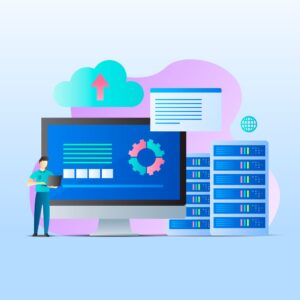Continued advances in technology offer small and midsized businesses (SMB) the opportunity to take advantage of cutting-edge solutions that were previously available to larger companies. A prime example of this is cloud-based ERP.
But what does this actually mean to your business? How different is it from an on-premise alternative? And why should SMBs take advantage of this? Learn more about it in this blog.
What Is A Cloud-Based ERP System?
A cloud-based enterprise resource planning (ERP) software uses a cloud platform that relies on the internet to give businesses the ability to integrate some existing functions while automating essential functions like financial and operational processes.
As its physical, on-premise counterpart, the cloud version also provides a central location for data, it helps streamline business processes, optimize resources, improve productivity and efficiency, and increase employee satisfaction and reduce frustration.
But, as our partner Netsuite says, ERP works best in the cloud.
Cloud ERP vendors typically provide software that a business uses working with a server owned by the vendor. What this means is that the software provider is responsible for a host of measures, including security, updates, backups, and data integrity.
As a business that uses a cloud ERP, the company isn’t responsible for any capital expenses, thus reducing costs. Also, the business only pays for the resources that it uses, and the company can back up its data regularly. A cloud ERP for small businesses is the ideal solution for companies that want to expand their operations and connect with their ideal audience quickly and efficiently, software manufacturer Phoenix AP states.
Benefits of Cloud ERP
Investing in ERP provides small and midsized businesses with a wealth of benefits, including:
-
Cost-Effective
A small business doesn’t have the budget for pricey software and hardware that isn’t performing well. Cloud ERP prices are typically more manageable because they offer the option of monthly subscriptions. Because ERP costs tend to be lower upfront, a small business’s budget isn’t as stretched to accommodate the change as it might otherwise be.
-
Versatility
Using a cloud ERP solution for small businesses increases their access to many functions. Because of the automation built into this software, visibility increases. It means that searching for data is streamlined and straightforward.
Therefore, users can check inventory management systems and levels with just a few clicks of the mouse. Manual processes are automated, saving money and time, also.
-
Simple Onboarding
Using a cloud ERP means the onboarding process is quick and straightforward. Built with a user-friendly interface, most people with the necessary computing skills will find that their learning curve is minimal. Intuitive menus make the ability to disperse data easy, for example.
-
Security
While larger companies’ data breaches make the news, protecting their customers’ sensitive information is even more critical to small and midsized businesses. They typically don’t have the extra resources to absorb the fallout that results from such a mistake.
A cloud-based ERP has security measures already layered into its operations for this purpose. Besides, the software and hardware are continually updated, so a small business doesn’t need to deviate resources to staying on top of this vital function.
-
Increased Functionality
A cloud-based environment offers an almost limitless capability of functionality for small to mid-sized businesses. This could mean integrating processes, accounting, and inventory management are connected, adding additional users to the system, or some other crucial function that can help the business grow and prosper, such as workflow automation. Therefore, this software solution sets the company up for success.
-
Easy Migration
Today’s ERP vendors are aware that many small businesses have on-site or existing data systems that need to be migrated to the ERP or integrated into some fashion. Usually, their software team has experience in assisting companies with deciding which of their existing systems should be integrated with the ERP and phased out in favor of more effective solutions.
-
Access to Cutting-Edge Technology
The problem with cutting-edge technology is that implementing it can be a costly experience. On-premise solutions put the burden of maintenance and operations squarely on the business itself. Choosing a cloud ERP provides a small business with all the advantages of state-of-the-art technology without the headaches and costs of having to stay on top of it.
3 Key Takeaways From This Blog
-
A cloud-based ERP offers a small business focused on growing the ability to do so.
-
With a low startup cost and budget-friendly monthly subscription fees, the company has access to a wealth of benefits that allow it to focus more fully on scaling up its operations.
-
Benefits include manageable prices, increased visibility, user-friendliness, built-in security measures, easy data migration and customer data protection, and constant updates.
{{cta(‘cc529c9e-735b-4f0f-8ae1-a3508a1a7c94’)}}



